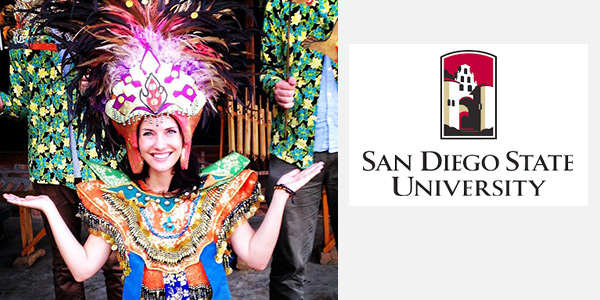
Kelly McEtchin is a San Diego State University student undertaking ACICIS’ Development Studies Immersion Program at Universitas Gadjah Mada.
Q: Why did you decide to undertake this ACICIS program?
I received a fellowship to study the Indonesian culture and language for 10 months. When researching online, I came across ACICIS and the programs seemed to be a perfect fit for what I was looking for. I started with the FLIP program to fully immerse myself in the language and decided to do DSIP the second semester for practical application.
Q: What classes are you currently enrolled in?
I am currently enrolled in the DSIP program which consists of 6 weeks intensive language study and 8 weeks of practical internship work. In addition, we also attend seminars on different social, economic, and geopolitical issues in Indonesia. It is extremely enlightening to see these issues first-hand, and the challenges the organisations undertake in order to mitigate future issues and find appropriate solutions.
Q: Are you involved in any clubs/societies at the university?
I am an English teacher for the English Community. I teach a few hours a month to students who have advanced proficiency English language skills but need continuing repetition in English vocabulary and conversation. The ages are between 6-12 years old. One student currently won the English Spelling Bee at his school!
Q: How will the Development Studies Immersion Program influence your future career or study?
The DSIP will influence my future career in several aspects. For one, America lacks language and cultural skills especially from more distant developing countries. I want to bridge that gap and eventually help establish more communication, tourism, trade, and education between America and Indonesia. Indonesia is rich with cultural wealth and contains some of the most unique flora, fauna, and landscape in the world. Tourism is flourishing here and there is a lot of potential for continuous growth. I believe that the U.S. and Indonesia could have a relationship that would mutually benefit each other culturally, economically, socially, and politically especially in the historic political landscape that we are currently living in.
Q: How does development in Indonesia differ to what you’ve seen before?
Indonesia is the first Asian country that I have ever visited so the development was completely different to anything that I have seen before.
Q: What do you like to do in your spare time in Yogyakarta?
I love to explore! Yogyakarta is considered the cultural hub of Indonesia. From trying new cuisine from different Indonesian regions, seeing a wayang show, listening to live traditional music, shopping for Batik and exploring different beaches, museums, rivers, and caves, you will never run out of things to do here.
Q: Are you undertaking an internship or volunteering while in Indonesia?
I am currently the internet literacy officer for a wonderful local NGO called Project Child Indonesia. I started the internship with them 7 months ago. The internet literacy program strives to educate children, adults, and teachers about the benefits of using the internet, internet taboos and safety, and WHY is it important to gain literacy skills now for personal and professional growth. We also work with a company called Gameloft which donate new computers to our schools.
Q: Favourite Indonesian food/ Favourite place to eat?
Too much to say!
Q: Favourite Indonesian word/phrase?
Luar Biasa! — extraordinary
Q: What places in Indonesia have you visited during your semester so far?
Flores – Learned to scuba dive there and swam with manta rays, sting rays, and cuttlefish
Komoda and Rincha island- got close-up and personal with the infamous Komodo Dragons
Karimunjawa – Ate fresh grilled fish and watched amazing beach sunsets
Jakarta – survived the hustle and bustle of the shopping metropolis
Solo – learned about the cultural significance of Batik at the House of Danar
Bandung – shopped till you dropped
Bali – monkey forest, coffee plantations, Uluwatu and Tanah Lot Temple
Beaches – Ngandong and Parangtritis
